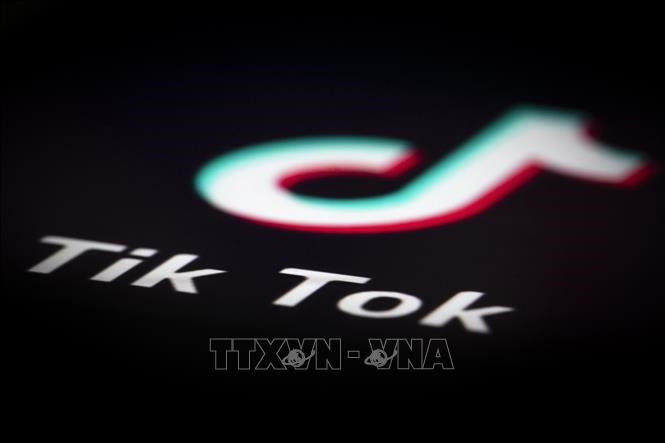Concerned about cybersecurity, many countries around the world have issued bans on installing TikTok
Currently, many countries around the world and the European Union (EU) have issued a ban on installing the TikTok application on devices owned by state agencies and governments due to security concerns from this application.
The bans have once again raised long-standing concerns about privacy and online safety, given that TikTok, like Facebook and Instagram, are all content platforms that appeal to users of all ages. The concerns behind these bans are not just about data security, but also about dangerous trends or inappropriate content being spread online.
 |
TikTok icon. Photo: VNA. |
US President Joe Biden supports bill to ban TikTok
In Washington, John Kirby, the White House National Security Council's strategic communications coordinator, confirmed on March 16 that the administration of US President Joe Biden continues to support a bill to address national security concerns about TikTok - a popular social media app owned by ByteDance Group (China).
Responding to an online press conference, Mr. Kirby reaffirmed the US government's support for the bill, known as the Restriction Act, which would give President Biden new powers to address threats from foreign technology and could allow the administration to ban the video-sharing app TikTok.
Many European countries announced a ban on installing the TikTok application
Also on March 16, the UK announced a ban on installing the video-sharing app TikTok, owned by ByteDance Group (China), on devices owned by state agencies and the government. This decision takes effect immediately.
The decision follows a review by the UK Cyber Security Centre (NCSC). Speaking in Parliament, Cabinet Office Minister Oliver Dowden said that third-party apps from a pre-approved list would only be allowed on state and government devices. “We will also ban TikTok from being installed on state and government devices, effective immediately,” he added.
The ban does not apply to personal devices, and there will be some exceptions for cases where TikTok needs to be used on government devices, the official said.
In Oceania, New Zealand announced that it will ban TikTok from devices with access to the country's Parliament network from March 31 due to cybersecurity concerns. Thus, New Zealand becomes the latest country to "ban" this video-sharing app on government-related devices.
The decision was made after consultation with cybersecurity experts, as well as discussions within the government and with other countries, said Rafael Gonzalez-Montero, chief executive of New Zealand Parliamentary Services.
Mr Gonzalez-Montero said that through discussions and consultations, Parliamentary Services had determined that the risks posed by the use of TikTok were unacceptable in the current New Zealand parliamentary environment. He said special support measures would be put in place for those who use the app to do their jobs.
Following similar decisions by many other European countries, the Dutch government announced on March 21 that people working in government agencies will not be allowed to install the TikTok app on their work phones.
The Dutch Interior Ministry also said it recommends that government employees not install on their work phones any apps from "countries whose cyber programs target the Netherlands or its interests." Last February, the Dutch intelligence agency listed a number of countries whose cyber programs pose an espionage risk.
Most recently, Belgium decided to ban federal government employees from installing the TikTok app on their official computers and phones.
In Rome, also on March 21, Italy's antitrust authority announced it had opened an investigation into the TikTok app because the platform allegedly violated rules by allowing the posting of "dangerous content" such as inciting suicide, self-harm and poor nutrition.
Italian authorities say the platform is rife with videos of young people engaging in self-harm. TikTok “lacks adequate systems to monitor content published by third parties” and violates TikTok’s own guidelines for removing dangerous content, the watchdog said.
The antitrust regulator is also investigating TikTok's use of artificial intelligence techniques that could potentially "cause undue influence" on its users. The probe involves TikTok's Irish subsidiary, which handles European customer relations, as well as its branches in the UK and Italy, the regulator said.
Sky News reported on March 17 that the TikTok application will be removed from the phones and devices of the Scottish legislature (United Kingdom of Great Britain and Northern Ireland) amid concerns about information security.
Sky News cited an email saying MPs and staff in the Scottish legislature had been “strongly” advised to delete TikTok, including from personal devices used to access the Scottish legislature’s IT systems.
The decisions on TikTok by Scotland and New Zealand came after the UK announced on March 16 that it would ban the installation of TikTok on devices owned by state agencies and the Government. This decision took effect immediately. Responding to the UK's move, the Chinese Embassy in the UK issued a statement criticizing London's decision as "interfering with the normal operations of relevant companies in the UK and will ultimately only harm the UK's own interests."
TikTok currently attracts more than 1 billion users worldwide, including 150 million users across Europe and about 100 million users in the US. However, authorities in many countries are concerned about the risk of data leakage when using this application.

